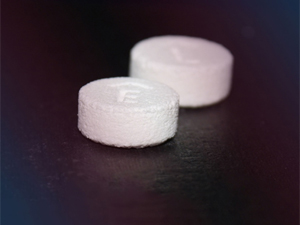



Date:28/03/16
 Being diagnosed with epilepsy can be hard to swallow. However, thanks to a new 3D printed wonder drug, its medication need not be. Aprecia Pharmaceuticals has announced the immediate availability of SPRITAM (levetiracetam), an easily swallowable seizure treatment manufactured using 3D printing technology. The drug became the first 3D printed medicine to receive FDA approval.
Being diagnosed with epilepsy can be hard to swallow. However, thanks to a new 3D printed wonder drug, its medication need not be. Aprecia Pharmaceuticals has announced the immediate availability of SPRITAM (levetiracetam), an easily swallowable seizure treatment manufactured using 3D printing technology. The drug became the first 3D printed medicine to receive FDA approval.
Many people believe that 3D printing will always be at its most useful when applied within the medical world. The technology is already widely used within the field to create customized prostheses and surgical models, and researchers believe that functional, bioprinted human organs could be just around the corner. Aprecia Pharmaceuticals, based in Langhorne, Philadelphia, is making its own contribution to the medical 3D printing revolution, by doing something no other company is currently doing on a mass scale: creating 3D printed drugs.
The FDA has approved SPRITAM, Aprecia's 3D printed epilepsy drug, which was created using the pharmaceutical company’s proprietary ZipDose Technology—a combination of 3D printing and formulation science which is able to produce rapidly disintegrating formulations of medications.
Originally developed at M.I.T., the technology can be used to make easier-to-swallow drugs, reducing swallowing challenges for the people who have experienced difficulty swallowing tablets and capsules. The newly available SPRITAM demonstrates this useful function, disintegrating in the mouth with just a small sip of liquid.
While the ZipDose Technology could be used to produce several kinds of medication, SPRITAM has been engineered to treat epilepsy. Aprecia’s 3D printed SPRITAM medication is designed to tackle partial onset seizures, myoclonic seizures and primary generalized tonic-clonic seizures, combining effective medicinal properties with an innovative approach to its ingestion.
First FDA-approved, 3D printed Spritam drug for epilepsy now available
 Being diagnosed with epilepsy can be hard to swallow. However, thanks to a new 3D printed wonder drug, its medication need not be. Aprecia Pharmaceuticals has announced the immediate availability of SPRITAM (levetiracetam), an easily swallowable seizure treatment manufactured using 3D printing technology. The drug became the first 3D printed medicine to receive FDA approval.
Being diagnosed with epilepsy can be hard to swallow. However, thanks to a new 3D printed wonder drug, its medication need not be. Aprecia Pharmaceuticals has announced the immediate availability of SPRITAM (levetiracetam), an easily swallowable seizure treatment manufactured using 3D printing technology. The drug became the first 3D printed medicine to receive FDA approval.Many people believe that 3D printing will always be at its most useful when applied within the medical world. The technology is already widely used within the field to create customized prostheses and surgical models, and researchers believe that functional, bioprinted human organs could be just around the corner. Aprecia Pharmaceuticals, based in Langhorne, Philadelphia, is making its own contribution to the medical 3D printing revolution, by doing something no other company is currently doing on a mass scale: creating 3D printed drugs.
The FDA has approved SPRITAM, Aprecia's 3D printed epilepsy drug, which was created using the pharmaceutical company’s proprietary ZipDose Technology—a combination of 3D printing and formulation science which is able to produce rapidly disintegrating formulations of medications.
Originally developed at M.I.T., the technology can be used to make easier-to-swallow drugs, reducing swallowing challenges for the people who have experienced difficulty swallowing tablets and capsules. The newly available SPRITAM demonstrates this useful function, disintegrating in the mouth with just a small sip of liquid.
While the ZipDose Technology could be used to produce several kinds of medication, SPRITAM has been engineered to treat epilepsy. Aprecia’s 3D printed SPRITAM medication is designed to tackle partial onset seizures, myoclonic seizures and primary generalized tonic-clonic seizures, combining effective medicinal properties with an innovative approach to its ingestion.
Views: 490
©ictnews.az. All rights reserved.Similar news
- Azerbaijani project to monitor disease via mobile phones
- Innovative educational system to be improved under presidential decree
- NTRC prolongs license of two TV and radio organizations for 6 years
- Azerbaijan establishes e-registry for medicines
- Azerbaijani museum introduces e-guide
- Nar Mobile opens “Nar Dunyasi” sales and service center in Siyazan city
- International conference on custom electronic services held in Baku
- OIC secretary general to attend COMSTECH meeting in Baku
- Azerbaijan develops earthquake warning system
- New law to regulate transition to digital broadcasting in Azerbaijan
- Azerbaijani State Social Protection Fund introduces electronic digital signature
- Intellectual traffic management system in Baku to be commissioned in December
- Tax Ministry of Azerbaijan started receiving video-addresses
- World Bank recommends Azerbaijan to speed up e-service introduction in real estate
- Azerbaijan to shift to electronic registration of real estate





















